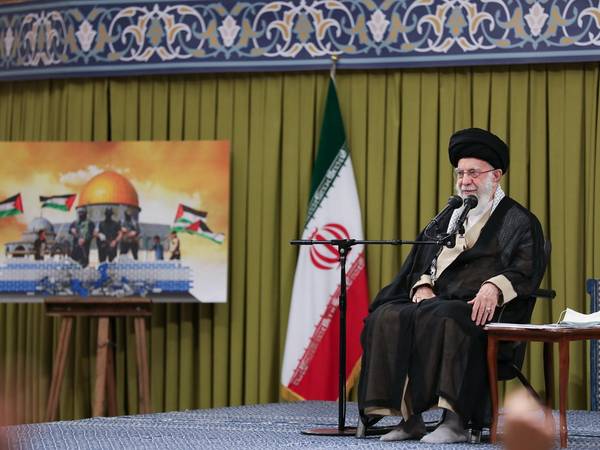While some top Iranian officials are trying to distance Tehran from Hamas and attacks on US bases, others continue their rhetoric against Israel and the United States.
Iran’s ruler Ali Khamenei attempted to counter international reports suggesting Iran's role in organizing pro-Hamas rallies in major European and US cities during a speech on Wednesday. He humorously dismissed the claims, saying it's as if the Basij militia of the Revolutionary Guard had branches in London and Paris.
Khamenei also appealed to all Muslim countries to boycott Israel, without signaling any willingness to directly render military assistance to Hamas.
In the same speech, Khamenei even distorted Iran's modern history by denying that the seizure of the US embassy in Tehran in 1979 ruined relations between Tehran and Washington for more than four decades.
This was, of course, tantamount to admitting that anti-Israeli rallies in Iran were stage-managed by Khamenei loyalists, although the rallies have been too small to attract any media attention.
As a former military commander Ghorban Ali Salavatian observed in his tweets, "These days, the social media pages of hardliners are full of videos that show pro-Palestinian demonstrations in Scotland, Morocco, New York, Sweden, Turkey and even Denmark. In Iran some five million people have registered to go to war in Gaza but none of them would take part in a pro-Palestinian rally." He wrote in another tweet: "The reason for this is that the Iranian society has been divided into outsiders and insiders, who beat on battle drums that the unhappy outsiders refuse to hear."
He was referring to the total monopoly of power by hardliners and the increasing ideological rigidity of the regime that has further alienated a populace disgruntled by economic hardships and lack of basic freedoms.
In another development, Mahmoud Abbaszadeh Meshkini, a member of the Iranian parliament's National Security and Foreign Relations Committee, emphasized that opposing Israel's aggressions aligns with the Islamic Republic's ideals. He added that Iran and other regional states will not tolerate Israel's atrocities. Regarding US attacks on Iranian interests in Syria, he stated, "Iran will respond to these attacks globally," emphasizing Iran's strategic planning to retaliate. He concluded, "We will target the US from locations they cannot fathom."
In fact, the US conducted only one retaliatory strike against an IRGC target in Syria last week after more than two dozen drome and rocket attacks by Iran’s proxies on US bases in Iraq and Syria.
Asked how Iran is going to respond to Israel, Meshkini said, "The Islamic Republic will not reveal its secrets, but if Israel continues ground attacks on Gaza, Iran will hit Israel from somewhere Israelis cannot imagine." He was obviously talking about attacks from southern Lebanon and Yemen on the same day that missiles fired by Houthi forces in Yemen landed in Jordan rather than Israel. Meshkini then revealed what he called a secret and said that "the Houthis in Yemen, Hezbollah in Lebanon and other forces in Iraq as well as other forces in Syria are prepared to attack Israel if it crosses our red lines."
At the same time, Iran's Interior Minister Ahmad Vahidi said in an interview with reformist daily Sharq in Tehran that "The attacks on US forces in Syria has nothing to do with Iran." Vahidi added that attacks on the US forces are quite natural as Muslim nations in the region are not indifferent to the fate of the oppressed people of Palestine and fulfil their responsibilities to defend Palestinians. Vahidi further claimed that "It is the United States that has given the green light to Israel to attack Gaza and is managing the Israeli offensive."
Meanwhile, in another comment in defiance of Khamenei's more cautious posturing, Iranian lawmaker Ahmad Hossein Fallahi told Didban Iran website that "Some 150 Iranian lawmakers, many of whom are ex-IRGC officers who have fought in Syria, have expressed their readiness to be deployed to Gaza to fight against Israel."
Fallahi further insisted that Iran will continue to target US bases in Syria and the region. He said "the United States has 150 bases in the region within the reach of Iranian forces. We will target them if America makes a wrong move."
